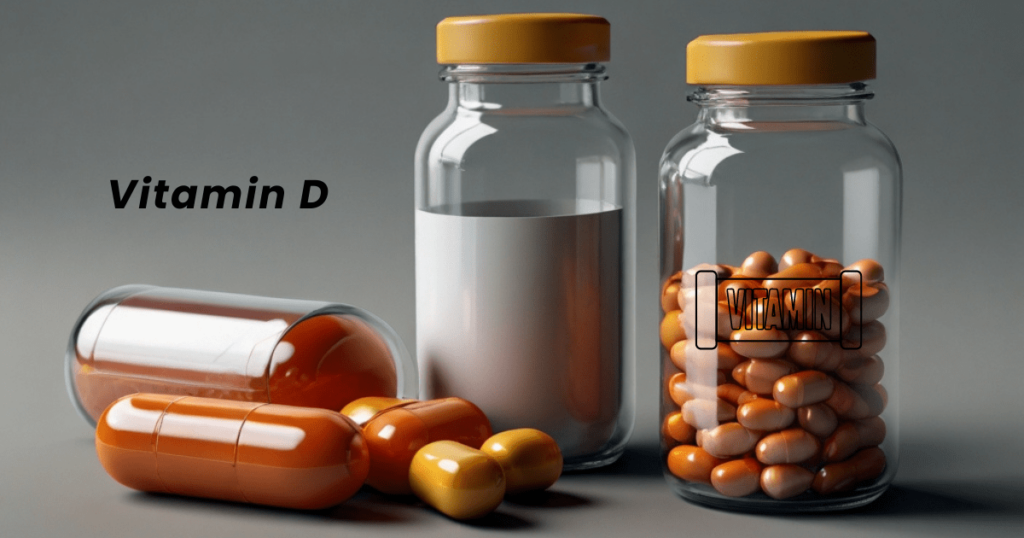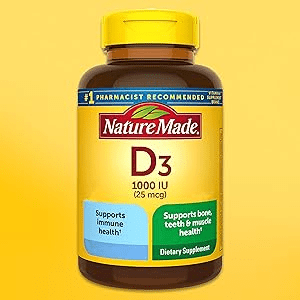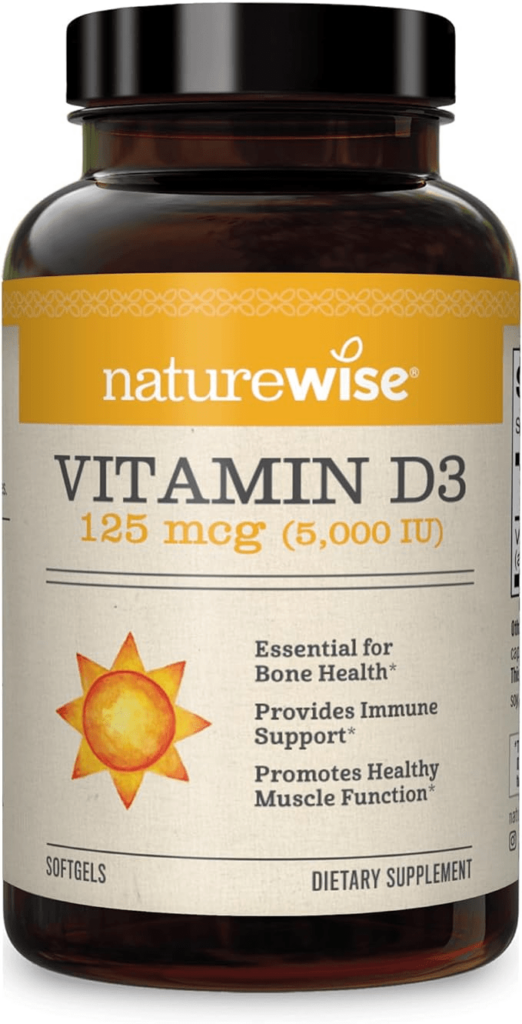Vitamin D deficiency occurs when your body doesn’t get or process adequate amounts of vitamin D. Vitamin D helps your body absorb calcium, so a deficiency can lead to osteoporosis (low bone density) and fractures (broken bones). Other low vitamin D symptoms include muscle weakness and cramps, hair loss, and tiredness or fatigue.
Most people have the vitamin D that their body needs, but as many as one in four adults in the United States are deficient. This is partly because vitamin D isn’t quite as easy to get naturally as some other nutrients. Your body makes some vitamin D when you are in the sun, and you can also find it in foods like fish, egg yolks, and fortified foods—as well as in supplement form.

Vitamin D deficiency can be hard to diagnose because it either produces no symptoms or its symptoms overlap with many health conditions. The good news: a vitamin D deficiency is relatively easy to treat with supplements once your healthcare provider identifies that you’re deficient.
Signs of Low Vitamin D
Fatigue and Tiredness
It’s unclear exactly why low vitamin D levels might make you feel tired or lead to fatigue, but multiple studies have shown that people who take vitamin D supplements report an improvement in fatigue and an increase in overall energy levels.
Frequent Illness
Vitamin D bolsters the immune system. If you’re constantly getting sick—or becoming seriously ill with even minor infections—a deficiency could be to blame. In fact, some research has found a link between higher disease severity in people in intensive care units (ICUs) and low levels of vitamin D. This was examined again after the onset of COVID-19. Studies showed that people with deficiencies may have had a higher risk of getting COVID and getting sicker from the virus.
Muscle Pain and Weakness
Vitamin D promotes muscle function. Low vitamin D levels may increase the likelihood of experiencing symptoms such as loss of muscle tone, atrophy (muscle loss), weakness, and pain. Losing muscle mass and strength can also make you more prone to falling.
Back Pain
The loss of muscle strength can lead to increased stress on your back and neck muscles, which can lead to back pain.
Lower back pain in particular is a common complaint among people with vitamin D deficiencies. Some experts suggest screening people with lower back pain for vitamin D deficiencies may be helpful, as treatment such as vitamin D supplements, can ease pain-related symptoms.
Bone Fractures and Osteoporosis?
Our bodies rely on vitamin D to help absorb calcium and grow bones that stay dense and strong throughout our lives. A deficiency can cause osteomalacia in adults, a condition that leads to the softening of the bones.
This can lead to a loss of bone density, which can contribute to osteoporosis and fractures (broken bones). Approximately 50% of women over the age of 50 will break a bone because of osteoporosis.
The risk of osteoporosis increases with age. The National Osteoporosis Foundation recommends an intake of 400-800 international units (IU) of vitamin D per day for adults under the age of 50 and 800-1,000 IU for those over the age of 50.
Hair Loss
Vitamin D plays an important part in regulating the hair cycle, including the regeneration of new hair. That said, it’s possible that a deficiency could slow hair growth.
Alopecia is an autoimmune disorder that causes hair loss. People with alopecia have lower levels of vitamin D, and topical vitamin D treatments have been used to improve symptoms.
Depression
The research is mixed on whether taking vitamin D supplements can improve existing symptoms of depression, but multiple studies and reviews have shown that people with a vitamin D deficiency may be at an increased risk of experiencing depressive episodes.
Weight Gain
Low vitamin D can cause weight gain. People with obesity (excess fat cells) are 35% more likely to be vitamin D deficient than people without obesity. They’re also 24% more likely to be D deficient than people who are considered overweight.
Healthcare providers diagnose obesity using a tool called the body mass index (BMI). BMI is an imperfect tool because it’s solely based on your height and weight. Providers may also consider your waist circumference (the measurement around your waist). Research suggests that a larger amount of adipose tissue (body fat) around your abdomen may increase your risk of chronic health conditions like heart disease and diabetes, a chronic disease that occurs when you have higher than normal levels of blood glucose (blood sugar).
The accumulation of vitamin D in adipose tissue might explain why people with obesity have low vitamin D blood levels. Fat cells hold on to vitamins and don’t release them into the blood efficiently.
How can I prevent vitamin D deficiency?
The best way to prevent vitamin D deficiency is to ensure you’re getting enough vitamin D in your diet and/or through sun exposure. But be careful about being in the sun for too long without sunscreen. Excessive sun exposure puts you at an increased risk for skin cancer.
The amount of vitamin D you need each day depends on your age. The average daily recommended amounts are listed below in micrograms (mcg) and International Units (IU).
| Age / Life Stage | Recommended Amount |
|---|---|
| Infants up to 12 months old | 10 mcg (400 IU) |
| People 1 to 70 years old | 15 mcg (600 IU) |
| Adults 71 years and older | 20 mcg (800 IU) |
| Pregnant and breastfeeding people | 15 mcg (600 IU) |
Best Sources of Vitamin D
The goals of treatment and prevention for vitamin D deficiency are the same: to reach and then maintain an adequate vitamin D level in your body.
While you might consider eating more foods containing vitamin D and getting more sunlight, your healthcare provider will likely recommend taking vitamin D supplements.
Vitamin D comes in two forms: D2 and D3. D2 (ergocalciferol) comes from plants. D3 (cholecalciferol) comes from animals. You need a prescription to get D2. D3, however, is available over the counter. Your body more easily absorbs D3 than D2.
Frequently Asked Questions
What causes vitamin D to drop?
Vitamin D levels can become deficient if you don’t get enough exposure to sunlight, don’t consume enough of the vitamin in the foods you eat, or if you have a health condition that limits your ability to process or absorb vitamin D.
Does low vitamin D cause weight gain?
There is some evidence that people with vitamin D deficiency are more likely to become obese, possibly because excess fat prohibits the processing of the vitamins in the body. There hasn’t been a direct correlation made between low vitamin D and weight gain, and more research is still needed.
What happens when your vitamin D is very low?
Often, nothing noticeable happens. Most people with vitamin D deficiency are asymptomatic, but that doesn’t mean there aren’t changes occurring within the body. Vitamin D is considered a “building block” for many body systems, so low levels can interfere with your body’s ability to produce strong and healthy bones, maintain proper muscle tone, fight infections, and regulate mood, energy, and sleep.
Top picks Vitamin D Supplements
PROS
CONS
The Bottom Line
This vitamin D supplement is highly effective in boosting energy and improving mood, with the added benefit of small, easy-to-swallow pills that do not cause acid reflux.
However, the packaging design may cause inconvenience, as the small opening makes it difficult to dispense a single pill without potentially spilling others, which can be frustrating for daily use.
Despite the effectiveness of the vitamins themselves, potential buyers might consider the hassle of the bottle’s design before purchasing.

A
Overall Grade
PROS
CONS
The Bottom Line
This product effectively meets daily nutritional needs, particularly for those with specific deficiencies, offering small, tasteless pills that are easy to swallow and available at a convenient price through subscription services.
However, some users might experience increased appetite or hunger shortly after consumption, which could be a drawback for those with limited access to food or who are managing dietary intake.
Prospective buyers should weigh the benefits of convenience and effectiveness against the potential side effect of altered eating habits.
PROS
CONS
The Bottom Line
This vitamin D supplement offers an affordable alternative to prescription options, with easy-to-swallow pills that lack a medicinal smell, enhancing user comfort.
However, there are significant concerns regarding quality control, as evidenced by reports of an overwhelming and unpleasant odor upon opening the bottle, which may suggest storage or manufacturing issues. Potential buyers should be aware of these inconsistencies and consider the possibility of receiving a compromised product.
Overall, while the supplement is effective and affordable, the risk of receiving a defective product cannot be ignored.





